The Kidhood of
Billy the Kid
A Most Merry and Illustrated History of a Most Unlikely American Icon
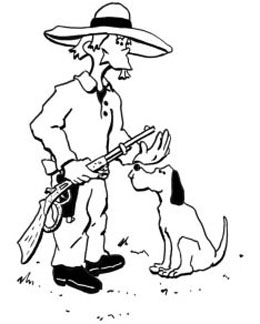
Billy the Kid Kind to animals, children, and women.
Introduction - Billy the Myth
Billy the Kid should never have been the most famous character of the Old West. He certainly should not have ended up with the reputation of being the most formidable outlaw in American history. When you get down to it, he never should have been an outlaw, period. Instead, he should have been remembered by his friends and acquaintances as a young ranch hand who lived through a tumultuous era on the American frontier but later settled down and went into ranching himself, married, and raised a family in south central New Mexico. Unfortunately, this the more idyllic scenario never materialized.
Almost inevitably the popular media (the first film about Billy was produced while many of those who knew him were still alive) has pictured Billy as a congenial and friendly young man who was driven to outlawry by forces beyond his control. Billy was kind to children and animals, we hear, courteous to women, and did not smoke or drink (and two out of three isn't bad). He was also literate, well-liked, and respected by his friends.
This image soon raised the hackles of the law and order crowd. To this day there are three men in the list of New Mexico's lawmen who died in the line of duty in the late 1870's: William Brady, George Hindman, and Robert Olinger. All were killed by Billy the Kid or in Sheriff Brady's case, shot from ambush to which Billy was a party. Billy the Kid was not, we are told sternly, a man to be admired or pitied.
The truth, as always, is far more complicated than what you can glean from films, television, or even some literature. Sad to say, there is absolutely no reason a cold blooded murderer cannot have a congenial personality, be well-liked by his friends, and be courteous to women and kind to children. And as far as we can tell Billy really did not smoke or drink. But then, neither did Pancho Villa.
But the biggest surprise to the "Billy was bad" crowd was that he committed one of his most notorious crime - the ambush-killing of Sheriff Brady - when he was a duly and legally appointed officer of the law. Billy had been one of a group of men deputized by the city magistrate of Lincoln, New Mexico to apprehend the murderers of local rancher John Tunstall who also had been Billy's employer. The trouble is, the murderers of Tunstall were also lawmen who had been deputized by the county authorities. In fact the "gang" that killed Tunstall was also a legally convened posse that had been organized by Sheriff Brady. It was, as we shall see, a most complicated and confusing time.
Despite what you may read about the - quote - "mystery" - unquote - of Billy the Kid, the world knows more about Billy than virtually any other Old West character. His doings were documented in contemporary new accounts and legal documents and his actions were seen and reported by credible witnesses. He was even interviewed by a newspaper reporter whose story left us a first hand contemporary description of his speech, appearance, and manner. He was - and there is no reason to doubt the account - cheerful, polite, and respectful.
We also know a lot about Billy from people who knew him personally. In later years after Billy the Myth had solidified, few of Billy's friends (or enemies) were hesitant to speak about him whether it was to young children they met or to the various writers or historians who came their way in the early twentieth century. Yes, some accounts have to be taken with a few pounds of salt, and memories are easily shaped by what had been written in various books and articles. But many of Billy's friends did their best to be honest, and by sifting through all the information we can get an accurate picture of Billy and his times.
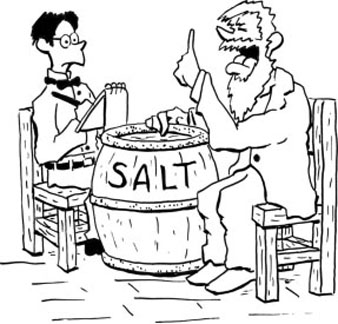
Few of Billy's friends were hesitant to speak.
That Billy should have settled down to a quiet and productive life is attested by the future lives of his fellow "outlaws". Many did indeed become valued members of their communities and had lives that extended deeply into the twentieth century. The New Mexico farmer and rancher, George Coe, who "rode" with Billy the Kid and was with Billy in some of his most famous gun battles, lived until 1941. Naturally George was a much sought after source of information for his young protégé. He even left us a book (albeit ghost written) of his days with Billy called Frontier Fighter. Although you can question the details here and there, his book is a major source of the fracas that historians now call the Lincoln County War.
We can put one myth to bed right away. Billy the Kid was not left-handed. The famous photo is a tin-type which produces a reversed image. We know the image is reversed because the Winchester that Billy is holding has the ammunition breech on the wrong side. So a definitive tip-off for a Billy the Kid imposter - of which there were many well into the mid-twentieth century - is one who wore his gun on the left.
Chapter 1 - The Early Kid
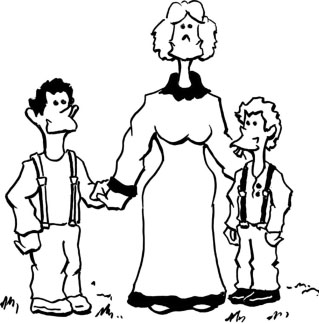
Catherine and the Kid(s)
Finding out what Billy the Kid's real name was is like trying to find macaroni and cheese on the wine list in a French restaurant in the Italian district of Sioux City. There are three names most people select. Billy Bonney is the Kid's most famous "real name", and that is the name he gave to a census taker in New Mexico in 1880. On the other hand, Billy once went on record as "Kid" Antrim, adding that "Antrim was my stepfather's name". The newspapers at the time referred to him as Henry Antrim. But the true Kid cognoscenti - and most modern biographers - tell you Billy's real real name was Henry McCarty.
Billy's - or rather Henry's - mom was an Irish immigrant named Catherine McCarty, and she had two children. The oldest was our Henry, and the youngest was Joseph, known as Josie. But we are not even sure about the chronology here, either. Throughout his relatively long life, Josie was not consistent regarding his birthday and gave birth years as varied as 1854 and 1863. When he was younger what he said fit with the 1863 date, and the 1854 time frame was what he said as an old man. Historians, though, usually rate dates given in relative youth as the more reliable since ratcheting back birth dates is not unusual as your mind gets a bit fuzzy with age - particularly if you yourself may not be completely sure when you were born. Finally, in Depression era America, claiming an older age made it easier for senior citizens to justify eligibility for various pensions. Still, today's consensus, by no means unanimous, is Henry was the oldest of the kids.
The earliest record of Catherine places her in Indianapolis in 1867. By then she was in her late thirties and had met a man thirteen years her junior named William Antrim. At this point it is not clear if William was a hired hand, a casual friend, a helpful neighbor, or a boyfriend. These various classifications are, of course, by no means exclusive.
One way to rationalize Henry's multiple monikers is that Catherine had first married a man named Bonney by whom she bore her first son whom she christened William Henry Bonney - our Billy. Then after she became Mrs. McCarty she gave birth to Josie, making her second son William's half brother (as some newspapers from the 1880's attest). Then when Catherine met William Antrim, she began to call her eldest son by his middle name to distinguish the elder and younger Williams. Hence the young Billy Bonney became Henry McCarty, and in later years he returned to using his original name. This scenario, a combination of solid documented evidence (Catherine's early association with William Antrim), contemporary but unverified references (Joseph being Henry's half-brother), oral testimony of those who knew Billy (Henry being Billy's middle name), and total speculation (Catherine marrying a Mr. Bonney), is certainly possible. And who knows? It may even be true.
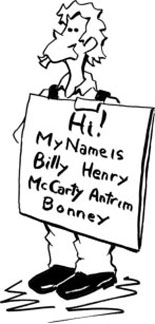
Henry's monickers
No one knows why the family pulled up stakes in 1870 and went to live in Wichita, Kansas. Possibly Catherine had already been showing signs of the "consumption" - that is, tuberculosis - which at the time was thought treatable by moving to a drier clime. It is in Wichita where we get our first look at Billy from people who actually knew him. All in all people remembered him as a perfectly normal boy.
In Wichita, Catherine became one of the leading businesswomen, running a laundry (which got a spontaneous accolade from the local paper) and selling baked goods. She was involved in civic affairs, and she and William both bought land. By staying nominally single, the couple could apply for separate, although adjacent, homesteads. That type of - ah - business arrangement was by no means uncommon in the nineteenth century west and was generally accepted without censure. On the farm Catherine and the kids planted fruit trees, and financially Catherine did well. But her deteriorating health - and William's desire to get into prospecting - prompted a further move to an even drier clime. That was in 1871.
The whereabouts of Catherine, William, Henry, and Josie are not known for nearly two years. Some say they went to New Orleans, but more likely they were living in Denver. But for certain, they show up in New Mexico, in Santa Fe, where on March 1, 1873 Catherine and William were married. Henry and Josie were present at the wedding, and the family soon moved to Silver City which was near the gold fields.
Again the speculation is Catherine's health prompted the move to New Mexico, but William was also hankering to try his hand at prospecting. While William put in time in the gold fields, Catherine continued with baking and taking in laundry, but not, it seems, at the same scale as before. Her health continued to decline, and their home was just a small cabin. So it is a bit doubtful that Catherine took in boarders, although one man who claimed to have boarded with the Antrims was an enterprising and somewhat bibulous writer named Ashmun Upson. Ash, as Billy the Kid fans know, was the ghost writer of at least part of Pat Garrett's book, The Authentic Life of Billy, The Kid: The Noted Desperado of the Southwest Whose Deeds of Daring and Blood made His Name A Terror in New Mexico, Arizona and Northern Mexico, A Faithful and Interesting Narrative. Certainly although Ash claimed he knew the Antrims, much of he wrote can be legitimately questioned.
In the relatively tame and conservative middle twentieth century the authors of articles about Billy the Kid would sometimes go off into spittle flinging diatribes about how movies and TV shows made Billy out to be - as one article put it - "a likable young man" - when he was really - again a direct quote - "a cruel cattle thief." Again we have an oversimplification here tempered by the times of the historian. Perhaps it's just the natural dichotomous tendency to pin a "good guy - bad guy" label on everyone that obscures the fact that very rarely are people all one or the other, or that real people do not necessarily have a single inherent personality that never changes. True, in his later years, Billy certainly had no compunction against shooting someone down if it suited his purpose. But in his boyhood and as long as he had a reasonably normal family life, the citizens of Silver City remembered young Henry as no different than any of the other kids. When the WPA writers showed up in the early 20th century and started asking the old timers about "Billy the Kid", the stories were consistent. Henry was a perfectly normal boy, friendly, cheerful, and courteous.
If the real name or personality of young Henry McCarty has been fodder for historical debate, his birthday has eluded any attempts at pinning it down. At the time of the 1880 New Mexico census, Henry - as Billy Bonney - was living on a ranch owned a friend named Charles Bowdre. After "Billy" gave his name, he added he was twenty-five years of age and was born in Missouri. So according to the most qualified source, the former Henry McCarty was born in 1855.
Virtually no one seems to believe this early date, and as we'll see below, it really does not make much sense. The "traditional" date, given by Ash in the first chapter of The Authentic Life, etc., etc., was 1859, and Henry's birthplace was New York City. This is what you usually read although scholars have scoured New York's census records and have come up with nothing except that in New York there were an awful lot of people named Catherine, Joseph, Henry, William, and McCarty.
The truth is the 1855 birth date is certainly wrong, and even the traditional year of 1859 may be too early. To understand why, we have to dig deeper into the times when Henry was living in Silver City.
In New Mexico, both Henry and Josie attended school. Once more the teachers remembered Henry as a perfectly normal student, no more prone to mischief than any other boy his age. On the contrary, one teacher remembered him as always willing to help out around the classroom. Given his later correspondence (yes, we do have letters written by "Billy the Kid"), he paid enough attention to his studies to develop excellent handwriting and write with a certain elegance.
Henry's pleasant personality was inherited from his mother. Catherine herself was not only cheerful and optimistic but gregarious and friendly. She loved to go out to the dances that at that time were one of the major social events in any town. She would take Henry with her, and the ladies never seemed to think it odd to trip the boards with a boy ten to twenty years their junior. Soon Catherine's son was cutting a rug with the best of them.
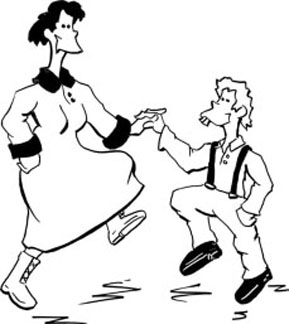
Henry was cutting a rug with the best of them.
As we said Catherine was gregarious and friendly - perhaps too gregarious and friendly. There is some suspicion that all was not well between her and William. After all, William was usually away prospecting, and Catherine was out dancing with the young swains about town. In any case there seems to have been a definite cooling between Mr. and Mrs. Antrim. In the last few months of her life, Catherine was bedridden, but during that time, William was nowhere around. Instead he was spending his time up in the hills prospecting for gold.
Catherine died on September 16, 1874, and although her two boys were at the funeral, her husband was not. Still, it seems William did what he could for the boys, given that he wanted to continue prospecting and mining and the (again hypothetical) cooling of affection between him and Catherine. He helped Henry and Josie find homes with local families, and Henry lived for a time with the family of Sarah Brown who ran a boarding house. For what its worth, it is possible that this is where Ash boarded, and so his claim that he did indeed know Henry the Kid may not be complete hogwash. Henry earned his keep by helping wash dishes and clean up. As usual he was helpful and friendly. Josie had more contact with their stepfather and from time to time lived with William.
But with Catherine dead and William away, Henry started to hang around with older men, some which were definitely "bad company". Henry began to frequent barrooms, where despite his tender age, he ended up learning the rudiments of popular card games, not only poker but Spanish monte. Here we see something that also stamped Henry's personality. Although young - quite literally a kid - for some reason he was able to move into a society of older men who tolerated his presence.
Inevitably Henry began to get into "mischief". At first these misdemeanors were minor pilfering for which he was either not caught or were scarcely considered worth bothering about. Also at that time Silver City's sheriff was Harvey Whitehill, a big man who nevertheless seems to have been tolerant of juvenile offenders. Henry's first run-in with Sheriff Whitehill was when the boy lifted a pound of butter from a local rancher named Able L. Webb. Sheriff Whitehill said in later years that he elicited a promise from Henry not to do it again. Another story was that Harvey fanned Billy's britches.
This incident is a subtle but important indication of Henry's age. The year was 1875, and according to Henry's own statement to the census taker he would have been twenty. The "official" birthdate - that is, 1859 - would put him at fifteen. Neither age makes much sense given the sheriff's action, whichever version of the story you buy.
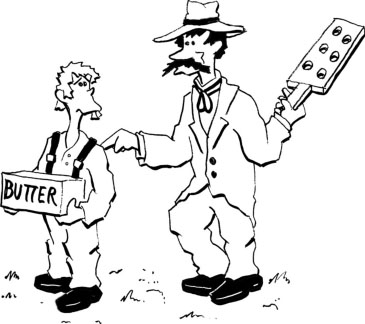
The sheriff elicited a promise from Henry.
Even at fifteen, a young man in a mining town would be considered more an adult than a kid - certainly he would be a "youth" and not a juvenile. Theft - even petty theft - would be handled before the courts. The action taken by the sheriff would be suited for an offender of probably ten or so - certainly not much older than twelve. That would put Henry's birthdate at about 1863 - Josie's traditional birthdate. We will elaborate more on Henry's possible age as we go along.
In Silver City Henry continued to hang around with petty criminals and older riff-raff who saw the willing and cooperative boy as a tool. In particular Henry had been befriended by with a local ne'er-do-well named George "Sombrero Jack" Shaffer. Sombrero Jack was notorious for both hitting the bottle and for stealing whatever wasn't tied down. One day some clothes and other items from a Chinese laundry went missing, and everyone agrees Sombrero Jack was the culprit. But he had given the items to Henry to hide in his room. The goods were found by Mrs. Brown and she promptly turned them over to Sheriff Whitehill.
The usual story is that Sheriff Whitehill decided it was time to "teach the boy a lesson" and so put him in the city jail. According to Harvey's son, his father intended to just leave Henry in the cell a few days and let him go. So he locked the kid up and walked away.
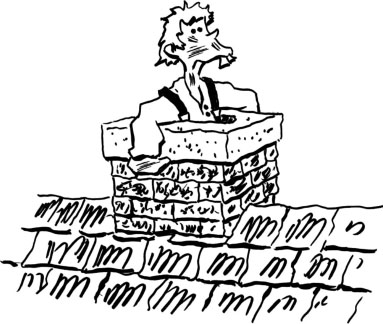
Billy took off.
No doubt Henry felt he would be sent to the penitentiary for life. That he could do real time is not really that far fetched since in the nineteenth century children as young as 10 years old were sometimes imprisoned in state and territorial prisons. And despite Harvey's son assuring us that the Sheriff was going to let Henry out after a couple of days, contemporary newspaper stories say Henry was in jail pending a grand jury investigation. But in any case, if the goal of the sheriff was to frighten Billy, he succeeded. If it was to teach the kid a lesson and reform him, it did not.
Sheriff Whitehill told the jailer it would be OK to let Henry in the corridor for a couple of hours a day. Then when he jailer was looking elsewhere, Henry chimneyed up the chimney, dropped down from the room, and took off.
A number of people claimed to have had first hand knowledge of how Billy got away. Again as always with first hand stories, the accounts vary a bit. One tale is the family he was staying with put him on a stagecoach. Another was that Henry stole a horse and rode off. But what is certain is that Henry found his way to the gold fields where his stepfather was still looking for El Dorado. That Henry found his stepfather was confirmed by William himself.
There are two stories of this meeting. One is that after Henry explained his misdemeanor to William, the older man told Henry if that was the type of boy he was then just to get out. Another version - from William - is William generously gave Henry all the money in his pocket. A compromise account culled from the two variants is that William listened to what Henry said, gave him some money, and went back to mining. He had done all he felt he could - or should.
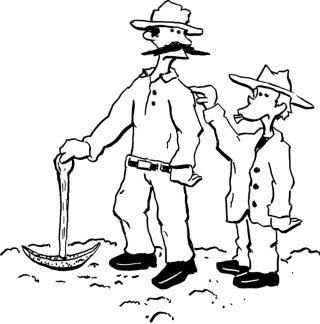
Billy explained his misdmeanor.
Chapter 2 - Henry the Bum
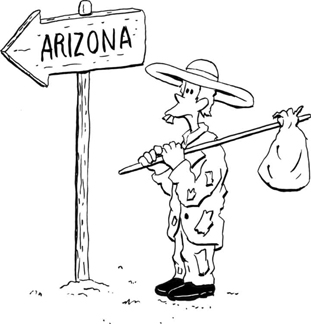
Henry was a bum.
What does a kid do if he is between twelve and sixteen and has no friends, no money, and no place to go? Well we don't know as a kid would do but we know out our Kid did. He headed for Arizona.
That actually made a lot of sense. In that day and age, a good way to avoid the law was simply to move to another state or territory. Extradition from one state or territory was not the routine procedure it's become, and today cooperation between states is much more highly coordinated more than most people realize. Recently a citizen of New England had been in one of the less populated Southwestern states and was briefly detained because he had been exceeding the legally posted speed limit. But since he didn't plan on returning any time soon, he simply tore the ticket and caught his plane home. Naturally he was greatly chagrined to receive a rather testy note from his own state's transportation department saying that if he didn't pay the ticket he would have is driving license revoked. He paid the ticket.
But in the nineteenth century American West once you crossed the border into another state or territory, you were pretty much safe from the law. Even murder was strictly a state or territorial affair. Few people know that Wyatt Earp had been indicted for the murder of an Arizona deputy sheriff, Frank Stilwell, in Tuscon in 1882, but had escaped to Colorado. Attempts by Arizona authorities to extradite him were unsuccessful, and eventually Wyatt made his way to California. He avoided Arizona the rest of his life and died in 1921 in Los Angles, still a fugitive from justice.
So there was no way anyone in New Mexico was going to bother trying to find a kid who had stolen some clothes who had skipped out to Arizona. But the big question was how well could Henry manage on his own. From what we read, it was as well as could be expected provided you didn't expect too much.
According to Robert "Ad" Casey, who met the Kid in 1877, "He was nothing but a kid and bum when I knowed him back then." Since Ad himself was only sixteen at the time, we again wonder if Henry was indeed a full seventeen years of age. But when Ad called Henry a bum, he was being quite accurate. In Arizona Henry quite literally bummed around, living on what he could borrow, beg, or steal.
However, given Henry's tender age and his later history, we need to point out that from the time he left his stepfather, Henry was inevitably armed. In fact, his first handgun may have been stolen from William. What type of pistol Henry carried then we don't know, but later his favorite handgun was the 1877 .41 calibre Colt double action revolver. This put Henry a bit out of mainstream among Old West outlaws since double action revolvers - that is a gun that fired simply by pulling the trigger without having to manually cock the hammer - were not favored by most gunfighters. Generally the extra force needed to pull the trigger reduced the accuracy. However, the extra speed of the double action revolver was evidently what Henry liked and eventually would stand him in good stead.
In Arizona, Henry - the name he still usually went by - got by doing what he could. Although he found some employment on the various ranches, it would be doing odd jobs or maybe acting as cook. The working cowboys didn't see him as a full ranch hand as he was too small and slight to do routine cowboy work.
But if he was in town, the young boy would gravitate toward the saloon. Once more his ability to be more or less accepted by older men and his own willingness to do whatever they wanted - whether it was to get into a game of monte or steal a horse - played to his advantage. But then as now, barrooms were not really places where kids should hang out.
For Henry, his life as a saddle bum in Arizona lasted for about two years and might have continued longer except for what became his first documented verifiable killing. In 1877, Henry moved into Camp Grant where as usual he hung out with the more raffish crowed. Here he became involved in horse stealing on a professional level. But his youth again came to his advantage, and once when he was caught with a stolen horse he was just let go on the spot. Later though the commander of the camp had enough of the young wiseacre squirt who was stealing the army's horses and put him in the guardhouse. Henry escaped, was recaptured, and then put in shackles that were riveted in place. But Henry had relatively large wrists - or rather very small hands - and could often slip cuffs. When the guard went back to the cells to check on Henry, Henry was gone.
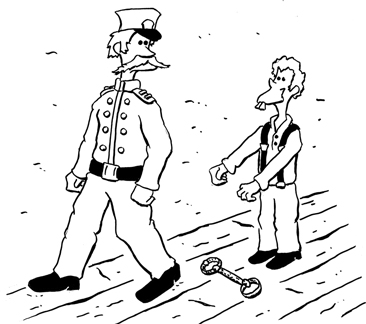
Henry had small hands.
Henry did not ride off into the sunset but hung around town. This was also a characteristic of Henry's mode of operation. He usually had more friends than enemies, and his friends would protect him. On the other hand, Henry seems to have taken little effort to hide himself and wandered around town at will. It seems that at this point the commander did not consider Henry worth bothering about any further.
In any case, on August 7, Henry walked into George Adkins' saloon. One story is he was decked out in fancy duds and a tough local blacksmith, Frank Cahill - known as "Windy" to his few friends - began to taunt the kid about being spruced up. But whatever the cause, Henry and Windy got into a fight.
The fight does not seem to have been your typical Hollywood fisticuff match with punches, jabs, uppercuts, and splintering of balsa wood breakaway chairs. Instead, the larger man - Windy weighed about 200 pounds - began pushing and slapping Henry around. Windy called Henry a pimp, after which Henry called Windy a son-of-a-bitch - the favorite epithet of the Old West. Frank threw Billy to the floor, held him down, and kept slapping his face. Then Billy pulled his own gun and shot Frank in the guts. The big man fell to the floor. Billy ran out of the saloon, grabbed the first horse he could find, and rode away.
In that day and age a gunshot wound to the stomach was almost always fatal and most doctor's did not even try to save the victim. That was true in Windy's case. But he lived long enough to give a dying declaration, which gives us the most immediate account of the first killing by the soon-to-be Billy the Kid.
"I, Frank Cahill, being convinced that I am about to die, do make the following as my final statement. My name is Frank P. Cahill. I was born in the county and town of Galway, Ireland. Yesterday, August 17, 1877, I had some trouble with Henry Antrim, otherwise known as Kid, during which he shot me. I had called him a pimp and he called me a son of a bitch. We then took hold of each other; I did not hit him, I think, saw him go for his pistol, and tried to get hold of it, but could not and he shot me in the belly. I have a sister named Margaret Flannigan living in East Cambridge, Mass., and another named Kate Conden, living in San Francisco."
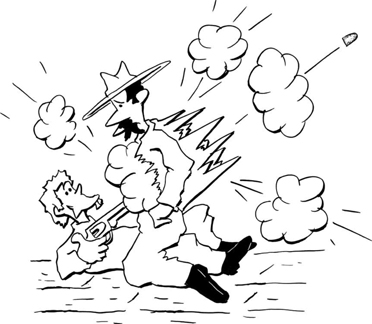
Henry and Windy.
Since Windy believed he was on the verge of eternity his dying declaration had the force of testimony under oath. But according to other witnesses, Windy had actually pinned the young man down and was in fact hitting him. Billy yelled for him to stop but Windy laughed and kept slapping the smaller man. Still back then a dying declaration had considerable force and the coroner's jury ruled Henry Antrim, alias "The Kid", had committed homicide, and the said homicide was unjustifiable.
Despite the ruling, in that day and age, Henry's actions would probably constitute legitimate self defense. Self-defense was very loosely interpreted. Once in Dodge City, "Mysterious Dave Mathers" had snuck up behind a man named Tom Nixon and shot him in the back. Mysterious Dave said that earlier Tom had "threatened him", so it was self defense. The jury agreed.
But as far as the law was concerned, because Henry had skinned out rather than face trial, the young man was no longer just a homeless teenager and petty thief. Instead he was a fugitive and wanted for murder. The best thing for Henry was to get out of the territory. Far better to be wanted for stealing clothes and breaking out of a city jail. So Henry returned to New Mexico but he moved east to the Ruidoso valley where he would first give his name as William Bonney.
Chapter 3 - Home Sweet Lincoln County
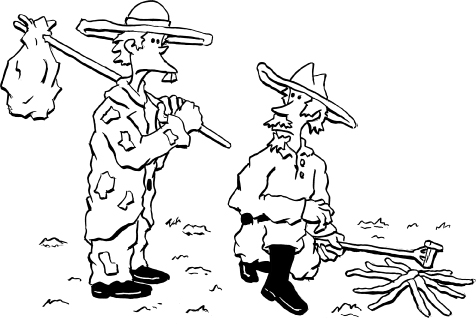
The Return of Henry
There are about as many stories of Henry McCarty arriving in Lincoln County as there are people telling them. The truth, though, is it took Henry a while to wind his way to what was then the largest county in the United States. Lincoln County was, in fact, larger than Rhode Island, and it was only later that the area was broken up to where it now includes areas in Chaves, Lea, Eddy, De Baca, Otero, Roosevelt, Soccoro, Torrance, and Curry counties.
When Henry first left Arizona he had been wayward confused kid, who panicked because he had been caught stealing some clothes. He returned to New Mexico as a wayward confused kid who was wanted for murder. As before he got by doing what he could, working at odd jobs, around the ranches, and hanging around towns. In town he tended to wind his way to the saloons and associate with the rougher elements. It was also in saloons where he could refine his gambling skills which, as any smart gambler knows, means he would act as the banker. Henry particularly liked Spanish monte particularly if he didn't have to pass the deal.
Sometime after his return to New Mexico Henry began calling himself Billy. For a while we read mixtures of references where the names Henry and Billy are tossed back and forth, but soon Billy was his name of choice. But among the men he met, he was just "Kid." His most famous tag, "Billy the Kid", wasn't used for quite a while and only after it was invented by a news writer.
That Billy would adopt an alias makes a lot of sense, and on his return, for the first time we hear him using the name Bonney. It's been speculated that Bonney was a family name - possibly the name of his real father. On the other hand it may have been the name of a fictional hero that appeared in popular dime novels. But Billy never entirely abandoned his legal name, Antrim, particularly in official proceedings (like murder trials), although he would point out that Antrim was his stepfather's name.
The chronologies of Billy's early days in Lincoln County are confused and dates uncertain. One of the first reports of Billy (with the Bonney surname) was when he showed up at the ranch of Barbara Jones in mid-October, 1877. Barbara's ranch was near Seven Rivers which she ran with her husband, Heiskell. Barbara - called "Ma'am" Jones by her many friends - woke one morning hearing furtive noises outside her house. Grabbing a gun she pointed it through one of the gun-ports and shouted for whoever it was to come out.
Instead of a masked desperado, out of the darkness stepped a young skinny kid, who had small hands and feet and - as Ma'am and others always seemed to always notice - two protruding front teeth. This was a kid, Ma'am realized, who had no business being out on his own. He obviously needed help, and Ma'am took charge and administered to his needs. She immediately ordered Billy to take off his boots and put his feet in a tub of hot water. She handed him a glass of milk which he ignored until she said she would hold his nose and pour it down his throat. When Ma'am asked the kid where he was from, he said he had escaped from a band of Apaches (unlikely) and had been walking for three days. He said his name was Billy Bonney.
Billy - as we'll continue to call him - hung around for a while - perhaps a couple of weeks, perhaps a few months - helping out on the ranch. Among Ma'am Jones kids were two sons, Sam and John, who figured tangentially in Billy's later life. For the rest of her long life, Ma'am Jones spoke well of Billy
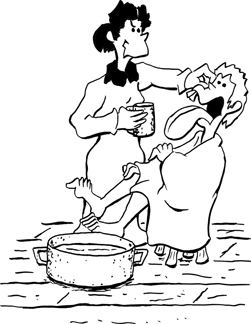
Ma'am administers.
Naturally, other families reported that Billy showed up at their homes and that they helped him out. Since Billy was literally bumming around there's no reason to doubt them. The family of a one established businessman and rancher named William Brady always said that William had put Billy up for a while. If true, the hospitality shown by the Brady family in general and William in particular is ironic indeed. as we will see.
Billy also stopped at the ranch of George Coe, who owned a ranch and farm near Fort Stanton. George worked the ranch with his cousin Frank, and both were well established figures in Lincoln County. The Coes, in addition to farming and ranching, were in demand as fiddlers for the local dances, the bailes, which Billy naturally took to.
George and Frank got to know Billy well. Frank tells us that Billy was seventeen when they met him, but looked a young fourteen. As at Ma'am's, Billy hung around the place for a while. Billy helped out by cooking for the men, but Frank said he was too small and slight to do any real work. Eventually he wandered off. But Billy and the Coes would meet again.
Frank's remarks give us another opportunity to pause a moment and consider Billy's age in more detail. If Frank is correct, then Billy would indeed have been born in 1859, a date which agrees with the official birthdate we get from Ash Upson. However, Frank's interview was given more than 40 years after the events, and likely Frank had read the book. But at the time Frank saw a fourteen year old kid whose boyish good looks and fetching grin immediately brought out the mothering instinct in older women, less mothering instincts in the young señoritas, and a condescending tolerance in older men.
Everyone seems to have remarked on Billy's youth, his slight stature, and of course, his two protruding front teeth. Usually the way out of the dilemma of Billy's claimed age (which in 1880 he said was twenty-five) compared to his youthful appearance is to simply say that Billy just looked much younger than his years. After all, everyone knows people who look twelve when they're really thirty, and so why can't that be true of Billy?
But as late as 1878 a newspaper reporter mentioned it looked like Billy didn't even shave and had only the traditional "school boy fuzz" above his upper lip. And a woman who remembered Billy in Silver City said Billy was nine years old when his mother died in 1874. So the obvious conclusion is that Billy really was much younger than he claimed, possibly between fourteen or sixteen when he roamed into Lincoln County. But the "official" birthdate is November 23, 1859, if anyone should ask.
With Billy's youth and genial personality, he could always find a place to stay and get a meal. Inevitably he was polite and respectful. Frank Lesnett had moved from Chicago to the Ruidoso Valley in 1876 and his wife, Annie, followed shortly after. She had been surprised at the ranch. Instead of being exiled to a land of scrub, dirt, and desert, she found herself living among beautiful hills naturally landscaped with tall pines and multi-colored wildflowers. Frank had purchased a half interest in Dowlin's Mill on the Ruidoso (a mill, by the way, which is still there) and had built a hotel and general store. Edith insisted on taking charge of running the hotel and the store, and her customers were mostly the neighboring ranchers and the Indians from the nearby Mescalero reservation.
Billy would show up from time to time, and Annie remembered him playing with the kids (and even holding her infant daughter) and taking the older kids for rides on his horse. She said he also had a dog who he had trained to chase after the puffs of dust when he fired his pistol on the ground. So not only can we accept that Billy really was kind to children and liked animals but he also was the first to discover the principle behind the laser toy. The dog, Annie said, thought the game was great fun, not realizing that a misplaced bullet would end the game abruptly.
Annie's story also shows us that even at a fairly tender age, Billy had become the proverbial good shot. Others remembered Billy's skill with firearms and even Pat Garrett, while discounting to the Kid any superhuman feats of marksmanship, admitted Billy was as good as most practiced gunmen and could shoot well under pressure. Pat's definition of good shooting, by the way, was hitting a 1 1/2 inch target two out of five times as fifteen paces, something Pat said he could do if he took careful aim and did his best.
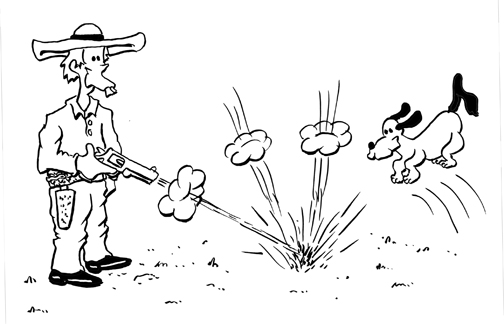
Did Billy invent the laser toy?
Billy usually didn't hang around ranches too long. A strong work ethic was never his strong point, and he preferred to get his cash - and cartridges we must add - by gambling. The towns in New Mexico in that era were often so in name only with perhaps a store and a boarding house to house the travelers. The - quote - "big cities" - unquote - like Lincoln might have a store or two plus various residences near by. Of course, there was the ubiquitous saloon, and so with Billy's usual mode of operation it was inevitable that he would begin to pal around with Jesse Evans and the Boys.
The Boys were the first bonafide outlaw gang that Billy joined. They were a true band of desperados who rustled cattle and stole horses on a truly commercial and enterprising scale. But they would also enjoy bouts of respectable work as being ranch hands for whoever would pay them. So they might be working on the ranch of John Chisum, the cattle baron of New Mexico, one week and where part of their job description would be supplementing Old John's herd from the smaller ranches near by. Or they might be stealing cattle from John and selling them to local businessmen such as L. G. Murphy.
Jesse Evans was the undisputed leader of the Boys. In his mid-twenties when he met Billy, Jesse had no hesitating shooting anyone if there was a reason, and when you get down to it, he really didn't need much of a reason. His relations with the authorities was complex. He might serve as on a posse with his Boys one day and be hunted by a posse headed by the sheriff the next. What really brought him notoriety was when he was arrested and thrown in the Lincoln County jail. At the time the jail was simply a hole in the floor of the sheriff's office and entered by a trap door. A number of the Boys rode up one night and at gunpoint freed Jesse and all the other prisoners. Among them was Billy.
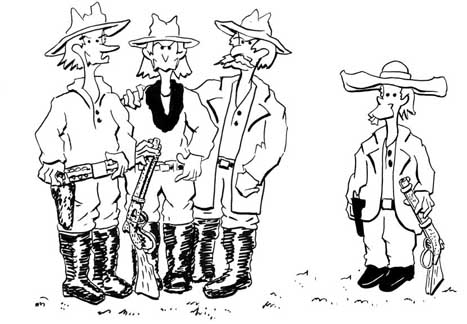
Billy, Jesse, and the Boys?
Billy ran with the gang intermittently, and he was never wedded to any one group. He also got into livestock rustling as an independent businessman. Billy's usual method was he and his buddies would raid the herd and if a local buyer thought the goods too hot and refuse to buy them, he would run them down to Mexico. The lengths of the stays were usually brief, but one of his friends remembered once he was gone for several months. Soon Billy could speak Spanish like a native, a skill that would serve to him in good stead.
Of course, if you steal cattle or horses, you turn the best profit if you steal from the large scale ranchers who have a never ending supply of the beasties. But the drawback is the cattle barons are also the ones who can pay the lawmen extra bonuses and bounties to apprehend the criminals. So it wasn't long before Billy once more found himself in jail for rustling from the ranch of John Tunstall. John was a young Englishmen then only twenty-four years old. John had come to New Mexico to make his fortune, and having been bankrolled by his wealthy father had purchased a large ranch and a large herd of cattle. But when John came to town to see about the prosecution, he actually visited the Kid in the jail. Whatever Billy said, - it was probably just an outline of his life - John had Billy set free. He even hired Billy as a ranch hand, and the rest, as they say, will be history.
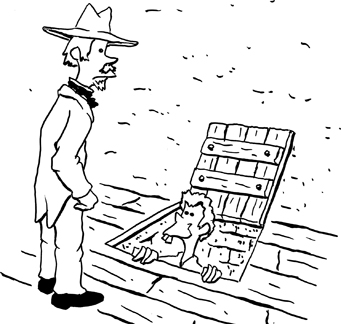
Billy meets John
Chapter 4 - Insurgency and Life Insurance in Lincoln County
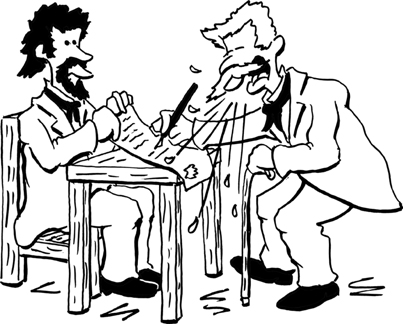
Life Insurance in Lincoln County
There have been only a few cases of insurgency in the United States itself. Insurgency, for those not well-versed in legal lingo, is a state which exists when a group of people are rebelling against the established government but where the government does not recognize the group as legitimate combatants under international law. In other words, an insurgency is a rebellion where the rebels loose.
So all the "rebellions" in the United States have really been insurgencies although they are usually called rebellions. We had the Whiskey Rebellion during Washington's presidency. There were also various slave rebellions such as the Rebellion of Nat Turner in 1831. Of course there was the Civil War which because Lincoln never recognized as a true rebellion and was also a mere insurrection.
But in 1878, President Rutherford B. Hayes issued a proclamation that there was an insurrection in the American Southwest. This was not, as you might think, one of the various Indian wars. Instead two groups of businessmen in Lincoln County, New Mexico, had developed competitive business plans that had strayed beyond the bounds of good taste. Today this fracas is known as the Lincoln County War. Without the Lincoln County War we would never have heard of Billy the Kid. And without Billy the Kid we probably would not be studying about the Lincoln County War.
The Lincoln County War started with a life insurance policy. In 1876, Emil Fritz, a businessman in Lincoln, New Mexico, had been in failing health. Emil's exact ailments are not know but were probably heart and kidney failure exacerbated by heavy drinking and smoking - two habits that were practically de rigueur for men in 19th century America.
Emil took out his life insurance policy from a New York based company and had it administered by local attorney, Alexander McSween. As Emil's health deteriorated, he went back to his native Germany where he finally died in 1877. McSween - called "Mac" by his friends - pushed the policy through. Mac got the money but was hanging on to it prior to receiving his fee. Why an unpaid policy led to the legend of Billy the Kid requires a bit of a digression before we return to the point.
Mac had come to Lincoln County in 1875 from Elmira, Kansas. Like many Americans who were heading west, he was an immigrant, in Mac's case from Canada. His background is a bit vague but appears to have been a preacher, teacher, and finally a lawyer. At the time you did not need a degree to practice law and bar entry requirements, if any, were minimal. Some lawyers may have had a year or so of law school and then hung up their shingles. That seems to have been the case for Mac.
Mac settled in Kansas, but moved West as the frontier expanded. So with his wife - the former Susan Hummer - he kept looking for the ideal setting for his law business and eventually landed in Lincoln.
Mac was not only the best lawyer in town, he was the only lawyer in town. In fact, he was the only lawyer for 150 miles around. So naturally Emil and his associates would hire Mac whenever they needed a lawyer. Since Mac worked on a freelance basis, he soon knew the ins and outs, the strengths and weaknesses of just about everyone.
Although his legal business was prospering there were some problems in his personal life. Rumors spread that Susan, Mac's wife, was what was then called a "loose woman". The rumors varied from her being just a bit free with the local menfolk and who would take a break with young ranch hands to actually having been a practitioner to gentlemen's needs on a professional basis. Part of the problem was Susan was not a lady to keep her opinions to herself. She also made a few remarks that some historians have interpreted that although Mac could provide legal services quickly and reliably for his clients, when it came providing service to Susan he had difficulty making the evidence stand up.
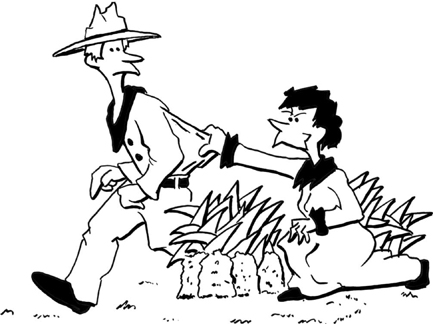
There were rumors about Susan
Emil had a business partner named Jimmy Dolan. Jimmy himself had been the junior partner to Lawrence G. Murphy. The corporation was quite commonsensically named L. G. Murphy & Co., but virtually everyone called it the House of Murphy or just the "House". The House of Murphy did not involve the type of house you may think. No, the House of Murphy simply a mercantile enterprise where, at least at first, Lawrence was in charge.
After the Civil War, Lawrence, Emil, and their fellow soldier, William Brady, had been mustered out of the Union Army at Fort Stanton, New Mexico Territory. In that area, there were virtually no Confederates to fight, Lawrence had been in charge of Fort Stanton where he learned how to administer to a company of soldiers and controlling a reservation full of Indians. Wondering what to do in civilian life, Lawrence and Emil set up a store at the fort where they sold liquor and other luxuries to the soldiers. The two men also applied for and received the appointment to be official Indian agents and began supplying beef and supplies to the Mescalero Apaches what were under the watchful eye of the army. They did very well and hoped to continue.
The trouble is being an Indian agent was a political appointment. Changes in administration produced personnel changes down the line and in 1869, a new agent was appointed by the newly elected President Grant. This irritated Lawrence and Jimmy, and things were not made any better when they had a run-in with the camp administrators which ended up with Jimmy threatening to kill the officers. Lawrence and Jimmy were ordered off the Fort.
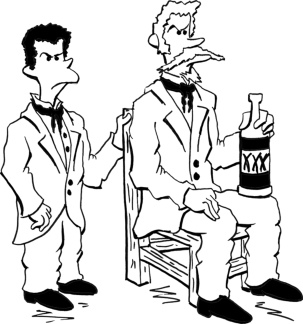
The House of Murphy
Jimmy and Lawrence
If there was anyone who was less of a "Jimmy", it was James Joseph Dolan. At 5' 2" he was even smaller than Billy and was only twenty when he started working for Lawrence, Jimmy was volatile, quick tempered, and as Mac's wife Susan said, would just as soon shoot someone as look at them. She said in that way, Jimmy and Billy were a lot a like. Jimmy's problem - if we see what happened in his later years - was he was fond of the bottle and as everyone knows, liquor and firearms don't mix and a hair-trigger temper makes it worse.
Being off the reservation, so to speak, Lawrence and Jimmy relocated to the town of Lincoln eight miles away. Fortunately, Lawrence and Jimmy found that a new Indian agent was appointed who happened to be their friend. So they made arrangements where they would supply the fort and the reservation while remaining based in Lincoln.
Lincoln was the largest town in the county although it was (and is) quite small by modern standards. It was also the center of commerce of the region. With a store on main street, Lawrence and Jimmy could also supply goods to the local population. By far most of the farmers and ranchers of Lincoln were Hispanic although a few whites - called Anglos - had been coming in. Ripping off the Hispanic population was standard business practice, and Lawrence and Jimmy had a monopoly and fully intended to keep it.
It also helped that by 1876 the sheriff of the county was Lawrence's friend and fellow comrade in arms, William Brady. If there were different interpretations regarding how a law should be enforced Lawrence and Jimmy knew William would be sympathetic to their needs. Also since foreclosures were executed by the sheriff Lawrence and Jimmy saw more opportunities.
So the House of Murphy began to get into what can honestly be called a racket. They would offer to sell land to the new inhabitants, financed, of course, by the funds of the House of Murphy. The principle and interest would be set so that it would be a good bet the owners of the land would not be able to pay back the loan. The House would then foreclose and get not only their land back, but all the crops and livestock that had been raised in the interim. Then Lawrence and Jimmy would start the whole process over again. The fact that the House had absolutely no claim to the lands they were selling was just one more perk in the deal.
One of the newcomers who - quote - "bought land" - unquote - from the House of Murphy was our young English friend, John Tunstall. When John first came to America, he wasn't quite sure what business to go into. Before then his only - quote - "job" - unquote - had been learning the drygoods business by working in the Canadian branch of his father's business. His heart wasn't particularly in his work and his father's partner, a Mr. Turner, sent less than satisfactory reports of how John, who lived with the Turners as a paying boarder. John, Mr. Turner reported, was not diligent in his work, slept late in the morning, and showed up late for breakfast. He preferred meeting the young ladies and going off on hunting trips with the men. John also got along so poorly with Mrs. Turner that he he felt compelled to seek lodgings elsewhere.
Eventually John decided he did not want to work for what he called the "Drapery house". That was not a job for a manly man. So he left Canada and went to the United Sates, with his finances being the periodic "draft" sent from his father.
But being financed by his dad meant John had quite a bit of flexibility. It didn't take long before he heard there were opportunities in the West, particularly in ranching. So he began to travel around, and by pure happenstance he met Mac in a hotel in Santa Fe. When the young Englishman outlined his plans to the older lawyer, Mac extolled the virtues of Lincoln County. John was sold on the idea and bought his ranch on the Ruidoso River about 10 miles from Lincoln. The only trouble was 1) John bought his land from the House of Murphy, 2) the House of Murphy did not own the land, and 3) John was planning to drive the House of Murphy out of business and take their place. In fact, John had even bought a building and opened a store just a hundred or so yards down from Jimmy's.
To say James J. Dolan was not pleased is like saying Al Capone was not pleased when Dion O'Banion decided to get his liquor from someone else. Still, Jimmy was a businessman and although he would have no problems with blowing John away, he figured he should try more or less legitimate ways first. So he looked for a way to deal with the irritating Englishman.
But Jimmy's business was also not doing too well, either - or at least he was a bit strapped for cash. After all, at that time and place, most people had little real money. Instead business was done using letters of credit, loans, promissory notes, and script, and it could be a struggle to get your hands on some actual cash.
Jimmy realized that one way to solve a lot of problems - financial and competitive - was to foreclose on John's ranch. But unfortunately John could pay back any and all loans since his dad could keep sending him (literally) thousands of pounds from England whenever the young man asked. But there were, shall we say, "other ways", particularly since Jimmy and the House were friends with the territorial governor.
That an outsider - particularly a "furriner" - thought he could waltz into one of the most lawless regions in America and push out some of the most ruthless men in the country who had connections with the territorial government is naive in the extreme. But John was indeed naive.
Jimmy had also become irritated with Mac. Originally, you'll remember that Mac worked for Jimmy as his lawyer. But then Jimmy learned that Mac decided to join John as a permanent partner. Decisive actin was needed, and Jimmy concocted a plan that would get John's land back to the House of Murphy and might even land Mac in jail.
Since Mac still had the money from Emil's insurance policy and refused to release it until he got his legal fees, Jimmy got Emil's relatives to file charges that Mac had "embezzled" the money. At the same time, Jimmy requested a writ of attachment - that is, an order to seize assets for enough to cover the claim - about $800. The job of attachment then, as now, fell to the sheriff of the county, who was, of course, Jimmy's friend, William Brady.
Sheriff Brady carried out his office with notable zeal. The trouble was Mac himself didn't own much hard assets. On the other hand, Mac's partner, John, did. So Sheriff Brady decided that what was John's was also Mac's and he should attach all the goods in the Tunstall store. So he walked down and despite the voluble protests of John's assistant, Robert Wiedemann, began inventorying everything in sight. But he gave himself a margin of error and attached everything the value of which was $40,000. Quite a margin for an $800 claim.
Still, the sheriff worried that even that wasn't enough. Who knows? If he was off in his value estimates by a few orders of magnitude, then he needed more to cover the insurance claim. So it seemed reasonable that John's livestock should be included as part of Mac's property as well.
Sheriff Brady had enough to do himself without personally riding out to the ranch - it was quite a ways off - and so the sheriff took advantage of his power to assemble a posse comitatus - that is a group of citizens he designated as deputies to assist him in his duties. And what better posse could you find other than Jesse Evans and the Boys? So Sheriff Brady called in Jesse and his gang. The Boys, now duly and legally deputized, set off for the Tunstall Ranch.
By the time the posse had served its writs, John Tunstall was dead, along with John's horse. Billy and his friends, being led by Dick Brewer, themselves became duly deputized by the city authorities. Then armed with warrants (and revolves and Winchesters) they came across two of Brady's - quote - "posse" - unquote - Bill Morton and Frank Baker. Alas, Bill and Frank - quote - "attempted to escape" - unquote - but Billy was able to successfully stop their flight. It was all in the name of law and order, Billy the Kid's kidhood was definitely over.